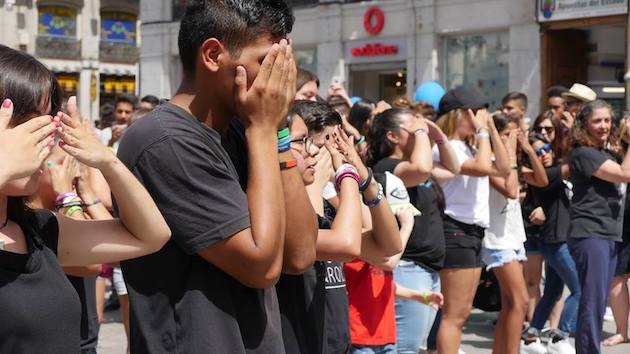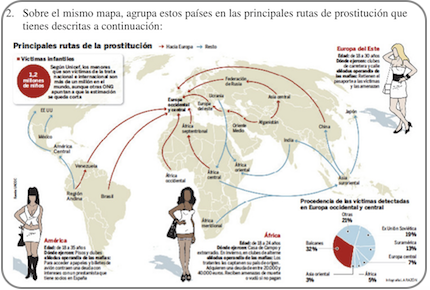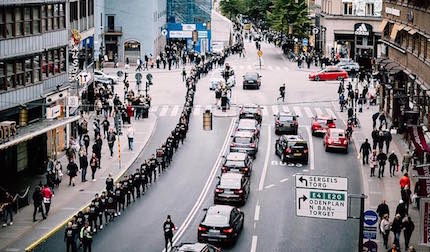Spain: The debate about prostitution returns to the spotlight
The laws punishes human trafficking, but prostitution remains unregulated. Christian organisation Esclavitud XXI hopes the Nordic Model will be adopted soon.
Protestante Digital · VALENCIA · 25 SEPTEMBER 2018 · 17:12 CET

Much of the human trafficking business in the world has to do with sexual exploitation, mostly of women who come from poor countries and end up being victims of a system that is closely connected to prostitution.
In Spain, human trafficking is prosecuted and punished. In fact, there is a department of the National Police dedicated specifically to this crime.
However, prostitution remains unregulated.
“ABOLITIONIST” GOVERNMENT APPROVED SEX WORKERS UNION
This irregular situation has led to a heated public debate lately. In August, there was an attempt to register the first union of sex workers. The creation of this association was approved and published in the Spanish Official State Gazette (the platform where laws are made public).
The scandal led the Government to acknowledge the mistake of allowing what was 'de facto' a step to legalise the practice of prostitution.
On Twitter, Spanish President Pedro Sánchez said that his government was in fact “a supporter of the abolition of prostitution”.
After the cabinet meeting held last Friday, September 21, the government spokeswoman Isabel Celáa emphasised that the cabinet is “against sex work”, but admitted that in Spain “there is no law about prostitution yet”.
“LEGALISING TRAFFICKING”?
Esclavitud XXI (Slavery XXI, in English) is one of the organisations that has been advocating to expose human trafficking in Spain. For years, its members have asked the different governments to take action to defend women that have been exploited and abused.
The association, under the umbrella of the Spanish Evangelical Alliance, has led several initiatives, including the collection of signatures to ask for an abolitionist model like the one in Sweden and France, which considers illegal the pay for sexual services, protecting women who are being coerced in different ways to prostitute themselves.
“Legalising prostitution would imply legalising trafficking, because both are practically the same”, Jorge Rodrigo, head of Esclavitud XXI in the city of Valencia said in an interview with Spanish news website Protestante Digital.
THE CASES OF GERMANY AND THE NETHERLANDS
Do scenarios in which prostitution is legal improve the situation of women? One might analyse the cases of countries like Germany or the Netherlands, where unions have been created and efforts to regulate the sex industry have been made.
According to Jorge Rodrigo, legalisation is not a solution against abuse, but rather the opposite.
“The regulation of the activity hardly takes place in reality, given that the majority of women remain underground. There is a minimum percentage of women who have made a contract or regularised their situation in these countries”.
Instead of creating a safer environment for women, these countries have become a “very comfortable place for human trafficking mafias. Everything goes through a supposed legal business, which facilitates their activity”, Rodrigo points out.
ABOLITIONISM
Esclavitud XXI defends that abolitionism is the best alternative. In short, this model consists of applying laws that do not penalise the woman who practices prostitution, but focus on the demand, the clients.
“Women are considered victims of sexual violence, and client as abusers”, says Rodrigo. This, he believes, has an effect on the demand since anyone who wants to hire a sexual service “would be committing a crime”.
HUMAN TRAFFICKING AND PROSTITUTION
Rodrigo believes that the distinction between trafficking and prostitution is unnecessary. “Prostitution and trafficking are essentially the same”, he says, because it is estimated that between 80% and 95% of women in prostitution in Spain are victims of trafficking.
Therefore, legalising prostitution would be “almost like legalizing trafficking, given that for the most part prostitutes come from trafficking, which is already a crime”.
Those who defend the regulation usually cite cases of women who practice prostitution by their own decision. But the statistics show they are a small minority. “We cannot regulate something by following the exception; the majority of prostitution comes from trafficking, therefore it is necessary to ban it. In Spain, the mafias have prospered”, explains Rodrigo.

THE DIFFICULTY OF GETTING OUT
Getting out of the world of prostitution is not easy. “These women come from situations of extreme poverty, they have resorted to prostitution in desperation, often forced”.
“The longer they have worked in this world, the more complicated it is for them because of the psychological damage. Reversing this process is complicated”.
On the other hand, it is difficult to get to know these women because “they are afraid of coercion, of the damage they can do to their family environment if they stop prostitution”.
Esclavitud XXI and other organisations work to try to win the confidence of women and help them. “Only between 1 and 2 per cent of women come out of this situation”, says Rodrigo.
THE CLIENTS
The lack of regulation in Spain, has allowed prostitution to become a big business that moves 22,800 million Euro a year.
A large part of the population still approves it. “People think that they are prostitutes because they have chosen it, and they do not understand the extreme suffering that these women have bore in order to become prostitutes”, Rodrigo says.
Additionally, the age of prostitution clients has decreased. “They are younger. Twenty-year-old kids who go to a brothel as a leisure option, after the disco”.
THE ROLE OF EDUCATION
Apart from the work that can be done in the legal or police field, Jorge Rodrigo says that in order to fight against prostitution and trafficking, regional governments could have an impact on education.
“Given that this area is transferred to the different regions, much could be done to educate young people about the reality of these women”, he proposes.
“Just like topics such as gender violence or equality have entered the educational field, issues such as human trafficking or prostitution should enter too. This is a pending issue”, Rodrigo adds.
RAISING AWARENESS
Among the initiatives pepared to raise awareness about traffickig in society, another abolitionist organization, A21, is organizing the march Walk For Freedom, which will be held this October 20, in 22 Spanish cities and elsewhere around the world.

In Valencia, the march is organised for the 5th consecutive year. “It consists of a line of people, dressed in black, walking in silence through the streets of the city. Meanwhile, information is distributed to passersby. It is a way to make trafficked women who cannot talk, visible; it is something shocking to see”.
Published in: Evangelical Focus - europe - Spain: The debate about prostitution returns to the spotlight
